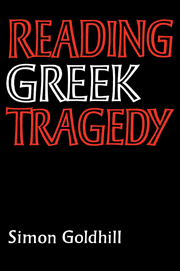Book contents
- Frontmatter
- Contents
- Preface
- 1 The drama of logos
- 2 The language of appropriation
- 3 The city of words
- 4 Relations and relationships
- 5 Sexuality and difference
- 6 Text and tradition
- 7 Mind and madness
- 8 Blindness and insight
- 9 Sophistry, philosophy, rhetoric
- 10 Genre and transgression
- 11 Performance and performability
- Bibliography
- Index
10 - Genre and transgression
Published online by Cambridge University Press: 08 February 2010
- Frontmatter
- Contents
- Preface
- 1 The drama of logos
- 2 The language of appropriation
- 3 The city of words
- 4 Relations and relationships
- 5 Sexuality and difference
- 6 Text and tradition
- 7 Mind and madness
- 8 Blindness and insight
- 9 Sophistry, philosophy, rhetoric
- 10 Genre and transgression
- 11 Performance and performability
- Bibliography
- Index
Summary
Horváth: Brecht always liked people to be aware that they were in a theatre. I said to him. ‘But Brecht, what makes you think they think they're anywhere else?’
HAMPTONThe innovative late works works of Euripides have given rise to dissension among critics and readers since their first performances. Aristophanes' characterization of Aeschylus in the Frogs pillories Euripides for bringing on stage royal figures dressed in rags, and Euripides' ‘deglamorization’ of tragedy has continued to provoke strong reaction. In particular, the intellectual stance of his plays, his turning to sophistic rhetoric for his agonistic debates, his sheer cleverness have been seen by critics as elements for reproach or regret. So Collard has recently written: ‘the poet is guilty of self-indulgent digression for the sake of rhetorical display at the loss of dramatic continuity and relevance’, and Winnington-Ingram has described Euripides as ‘capable of resisting everything but temptation – the temptation to be clever’. There is indeed an institutionalized tradition of strictures on Euripides' innovativeness. I have tried particularly in the previous chapter to show how the connection between the sophists and tragedy is not to be seen as a matter of the regrettable influence on poetry of a rhetoric of tricks or an improper intellectualism, but rather as an important indication of the radical tensions that draw together sophistic and tragic questions about man's place in the order of things. In this chapter, I am going to consider a further major area of innovativeness in tragic theatre that has proved instrumental in the evaluation and appreciation particularly of Euripides' oeuvre, namely, the poet's self-conscious marking and manipulation of the conventions of the genre of tragedy.
- Type
- Chapter
- Information
- Reading Greek Tragedy , pp. 244 - 264Publisher: Cambridge University PressPrint publication year: 1986



